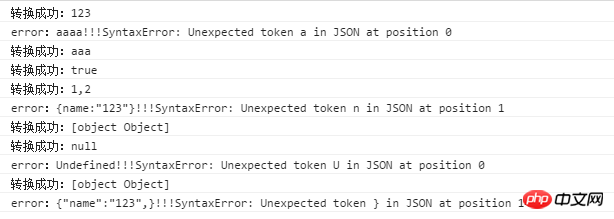Home >Web Front-end >JS Tutorial >How does js determine that a string is in JSON format?
How does js determine that a string is in JSON format?
- 零下一度Original
- 2017-06-30 13:18:382291browse
Preface
Regarding the problem of "js determines whether a string is in JSON format", I checked a lot of information on the Internet, but I didn't find the answer I wanted.
But after seeing this post"js determines whether a string is in JSON format", suddenly an idea flashed and I thought of a very Simple solution.
If you have any objections to this method, please leave a message to discuss.
Solution
function isJSON(str) {if (typeof str == 'string') {try {var obj=JSON.parse(str);if(str.indexOf('{')>-1){return true;
}else{return false;
}
} catch(e) {
console.log(e);return false;
}
}return false;
}Analysis
Like the previous post said, just simply useJSON.parse(str) cannot completely verify that a string is a string in the JSON format, there are many exceptions:
<span class="hljs-built_in">JSON.parse(<span class="hljs-string">'123'); <span class="hljs-comment">// 123</span></span></span>
<span class="hljs-built_in"><span class="hljs-string"><span class="hljs-comment"><span class="hljs-built_in"> JSON.parse(<span class="hljs-string">'{}'); <span class="hljs-comment">// {}</span></span></span></span></span></span>
<span class="hljs-built_in"><span class="hljs-string"><span class="hljs-comment"><span class="hljs-built_in"><span class="hljs-string"><span class="hljs-comment"> JSON.parse(<span class="hljs-built_in">'true'); <span class="hljs-string">// true<span class="hljs-comment"></span></span></span></span></span></span></span></span></span>
<span class="hljs-built_in"><span class="hljs-string"><span class="hljs-comment"><span class="hljs-built_in"><span class="hljs-string"><span class="hljs-comment"><span class="hljs-built_in"><span class="hljs-string"> JSON.parse(<span class="hljs-comment">'"foo"' ); <span class="hljs-built_in">// "foo"<span class="hljs-string"><span class="hljs-comment"></span></span></span></span></span></span></span></span></span></span></span> </span>
<span class="hljs-built_in"><span class="hljs-string"><span class="hljs-comment"><span class="hljs-built_in"><span class="hljs-string"><span class="hljs-comment"> <span class="hljs-built_in"><span class="hljs-string"><span class="hljs-comment"><span class="hljs-built_in"> JSON.parse(<span class="hljs-string">'[1, 5, "false"]'); <span class="hljs-comment">// [1, 5, "false"]<span class="hljs-built_in"><span class="hljs-string"><span class="hljs-comment"></span></span></span></span></span></span></span></span></span></span></span></span></span></span></span>
<span class="hljs-built_in"><span class="hljs-string"><span class="hljs-comment"><span class="hljs-built_in"><span class="hljs-string"><span class="hljs-comment"><span class="hljs-built_in"><span class="hljs-string"><span class="hljs-comment"><span class="hljs-built_in"><span class="hljs-string"> JSON.parse(<span class="hljs-comment">'null'); <span class="hljs-built_in">// null<span class="hljs-string"><span class="hljs-comment"><span class="hljs-built_in"><span class="hljs-string"><span class="hljs-comment"></span></span></span> </span></span></span></span></span></span></span></span></span></span></span></span></span></span></span>Null, Undefined.
Then we will test these types of strings.
The test results are as follows: From the above test results, and Definition of JSON. We can get a rule: If JSON.parse can be converted successfully; and the string contains {, then the string is a string in JSON format. If you have any objections to this method, please leave a message below, thank you. <span style="font-size: 16px;"><span style="color: #0000ff;">function</span><span style="color: #000000;"> isJSON_test(str) {</span><span style="color: #0000ff;">if</span> (<span style="color: #0000ff;">typeof</span> str == 'string'<span style="color: #000000;">) {</span><span style="color: #0000ff;">try</span><span style="color: #000000;"> {</span><span style="color: #0000ff;">var</span> obj=<span style="color: #000000;">JSON.parse(str);
console.log(</span>'转换成功:'+<span style="color: #000000;">obj);</span><span style="color: #0000ff;">return</span> <span style="color: #0000ff;">true</span><span style="color: #000000;">;
} </span><span style="color: #0000ff;">catch</span><span style="color: #000000;">(e) {
console.log(</span>'error:'+str+'!!!'+<span style="color: #000000;">e);</span><span style="color: #0000ff;">return</span> <span style="color: #0000ff;">false</span><span style="color: #000000;">;
}
}
console.log(</span>'It is not a string!'<span style="color: #000000;">)
}</span><em> <br></em></span>
<span style="font-size: 16px;">isJSON_test('123'); //number</span><br><span style="font-size: 16px;">isJSON_test('aaaa'); //string</span><br><span style="font-size: 16px;">isJSON_test('"aaa"');</span><br><span style="font-size: 16px;">isJSON_test('true'); //布尔</span><br><span style="font-size: 16px;">isJSON_test('["1","2"]'); //数组</span><br><span style="font-size: 16px;">isJSON_test('{name:"123"}'); //对象</span><br><span style="font-size: 16px;">isJSON_test('{}'); //空对象</span><br><span style="font-size: 16px;">isJSON_test('null'); //null</span><br><span style="font-size: 16px;">isJSON_test('Undefined'); //Undefined</span><br><span style="font-size: 16px;">isJSON_test('{"name":"123"}'); //json</span><br><span style="font-size: 16px;"><em>isJSON_test('{"name":"123",}'); //不规范的json</em></span>
The above is the detailed content of How does js determine that a string is in JSON format?. For more information, please follow other related articles on the PHP Chinese website!
Related articles
See more- An in-depth analysis of the Bootstrap list group component
- Detailed explanation of JavaScript function currying
- Complete example of JS password generation and strength detection (with demo source code download)
- Angularjs integrates WeChat UI (weui)
- How to quickly switch between Traditional Chinese and Simplified Chinese with JavaScript and the trick for websites to support switching between Simplified and Traditional Chinese_javascript skills

